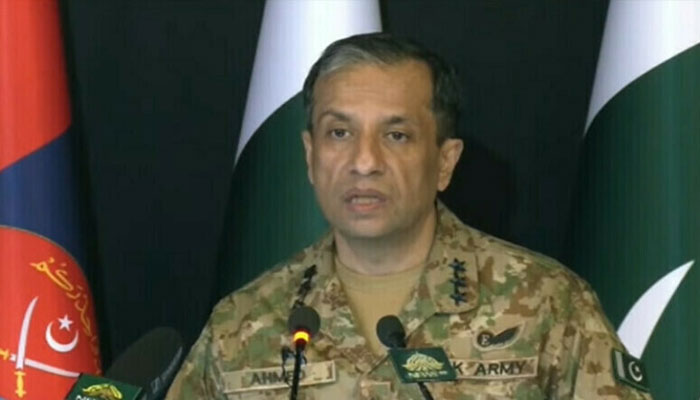India Involved in State-Sponsored Terrorism in Pakistan, Says DG ISPR Lt Gen Ahmed Sharif
Pakistan Army Downs Indian Quadcopter Near LoC in Bhimber
ISLAMABAD — In a major revelation, Director General of Inter-Services Public Relations (ISPR) Lt Gen Ahmed Sharif Chaudhry on Tuesday accused India of orchestrating terrorism inside Pakistan and presented what he called “irrefutable evidence” of state-sponsored cross-border terrorism.
The press conference came days after India blamed Pakistan for the recent Pahalgam attack in Indian-occupied Jammu and Kashmir (IIOJK), without providing any credible proof. The DG ISPR stated that despite a week passing since the incident, New Delhi has failed to back its accusations with any evidence.
“India is directly involved in terrorism within Pakistan,” said Lt Gen Chaudhry, unveiling a comprehensive account of Indian efforts to destabilize Pakistan through terror networks. He detailed that Indian operatives have been supplying explosives, IEDs, and funding to militants targeting both civilians and security forces.
Arrest and Evidence
The military spokesperson disclosed the arrest of an Indian-trained terrorist, Abdul Majeed, near the Jhelum bus terminal on April 25. During the operation, two and a half kilograms of explosives were recovered along with an Indian drone from the suspect’s residence and Rs 1 million in cash. Forensic examination of Majeed’s mobile phone confirmed direct communication with Indian contacts, including an Indian army Subedar named Sukhwinder.
Indian Military Involvement
Lt Gen Chaudhry claimed that four Indian military officers—Major Sandeep Verma, Subedar Sukhwinder, Havaldar Amit, and a soldier—were actively involved in directing terror operations inside Pakistan. The handlers were allegedly instructing militants to kill civilians and carry out bombings to portray Pakistan as a hub of terrorism.
The ISPR revealed that:
-
On November 30, Majeed planted an IED on a military vehicle in Jalalpur Jattan, killing four.
-
On March 18, an IED was placed near Kotli, which was later defused by security forces.
-
On April 22, another IED was delivered near Nadala, followed by instructions to attack a bus stand.
Video tutorials on bomb-making were also sent by the handlers, and large amounts of money were transferred after successful attacks, including a payment of Rs 656,000 following the Jalalpur Jattan blast.
Diplomatic Fallout
Following the Pahalgam attack, India has taken punitive actions including suspending the Indus Waters Treaty, cancelling visas of Pakistanis, and shutting the Wagah-Attari border. Pakistan responded by expelling Indian diplomats, restricting Indian visas (excluding Sikh pilgrims), and closing its main border crossing.
Pakistan has consistently denied involvement in the Pahalgam attack and offered to cooperate in a transparent, credible investigation.
Global Concerns
The situation has drawn international attention, with the United Nations calling for “maximum restraint” from both sides to avoid escalation. A report by The New York Times suggested that India is seeking global support not to calm tensions, but to legitimize possible military actions against Pakistan, despite lacking solid evidence.
Quadcopter Shot Down
On the same day, the Pakistan Army shot down an Indian quadcopter in the Manawar Sector near the Line of Control (LoC), accusing India of continued airspace violations for surveillance purposes.
Lt Gen Ahmed Sharif concluded by warning of the serious implications of India’s actions and reiterated Pakistan’s resolve to defend its sovereignty, calling for the international community to take notice of the ongoing provocations.
Read more: 15 Militants Killed in Security Operations Across KP: ISPR




Comments are closed, but trackbacks and pingbacks are open.